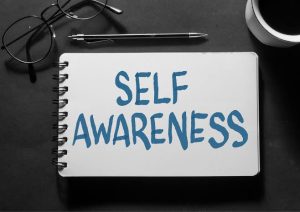Exploring Insights from Self-Awareness: Assessing Your Level of Self-Awareness
- Meaning of self-awareness
- The benefits of being self-aware
- Barriers to self-awareness
- How to develop self-awareness
Self-awareness is the conscious knowledge and recognition of one’s own thoughts, feelings, behaviors, and characteristics. It involves being in tune with your emotions, understanding your motivations, and having a clear perception of your strengths and weaknesses. Essentially, self-awareness is the ability to reflect on oneself, fostering a deeper understanding of one’s identity and how one interacts with the world.
The benefits of being self aware
The benefits of self-awareness are extensive and impact various aspects of personal and interpersonal well-being. Here are some key advantages:
- Self-aware individuals are better equipped to recognize and manage their emotions. This leads to enhanced emotional regulation, reducing the likelihood of impulsive reactions and promoting emotional resilience.
- Understanding one’s values, priorities, and goals enables more informed and aligned decision-making. Self-awareness provides clarity, helping individuals make choices that align with their authentic selves.
- People with high self-awareness tend to communicate more effectively. They can express their thoughts and emotions clearly, listen actively, and navigate interpersonal relationships with empathy and understanding.
- Being aware of one’s own experiences often translates into greater empathy for others. This ability to understand and relate to the emotions of those around you strengthens interpersonal connections and fosters healthier relationships.
- Self-awareness is foundational to personal growth. It allows individuals to identify areas for improvement, set realistic goals, and actively work towards becoming the best version of themselves.
- Awareness of stress triggers and coping mechanisms empowers individuals to manage stress more effectively. This, in turn, contributes to overall mental and emotional well-being.
- Self-awareness enables individuals to recognize their strengths and limitations. This awareness facilitates adaptability, as people can adjust their approaches and responses based on a realistic understanding of their capabilities.
- Individuals who are self-aware contribute to healthier and more fulfilling relationships. They are better at resolving conflicts, expressing needs, and maintaining boundaries, leading to more positive connections with others.
- Knowing oneself, including strengths and weaknesses, builds confidence. Self-aware individuals are more secure in their identity, which positively influences their ability to face challenges and pursue their aspirations.
- In a professional context, self-awareness is associated with effective leadership, strong interpersonal skills, and career success. It contributes to better teamwork, communication, and adaptability in the workplace.
- Ultimately, self-awareness plays a crucial role in overall well-being. By understanding oneself on a deeper level, individuals can make choices that contribute to a more fulfilling and meaningful life.
Barriers to self awareness
Several barriers can impede the development of self-awareness. Recognizing and overcoming these obstacles is crucial for personal growth. Here are some common barriers to self-awareness:
- Defensiveness:
A defensive mindset can hinder self-awareness by preventing individuals from accepting constructive feedback or acknowledging their flaws. Overcoming defensiveness involves being open to feedback and viewing it as an opportunity for growth.
- Denial:
Some individuals may consciously or unconsciously deny certain aspects of themselves, especially those that are uncomfortable or challenging. Overcoming denial requires a willingness to face difficult truths about one’s thoughts, behaviors, and emotions.
- Lack of Reflection:
Busyness and constant activity can be a barrier to self-awareness. Without regular moments of reflection, individuals may overlook their emotions, motivations, and patterns of behavior. Creating time for introspection is essential.
- Fear of Change:
Fear of change or the unknown can prevent individuals from delving deeper into self-awareness. Embracing self-awareness often involves confronting areas that may require change, and overcoming this fear is crucial for personal growth.
- External Validation Dependency:
Relying excessively on external validation can hinder self-awareness. If individuals derive their sense of self solely from others’ opinions, they may struggle to understand their true feelings, values, and desires.
- Cultural and Societal Expectations:
Societal norms and cultural expectations can shape individuals’ self-perception. Conforming to external expectations may lead to a lack of authenticity and hinder the exploration of one’s genuine identity.
- Stress and Overwhelm:
High levels of stress or overwhelming life circumstances can divert attention away from self-awareness. Coping with stress is essential for creating mental space to reflect on one’s thoughts and emotions.
- Unconscious Biases:
Unconscious biases and prejudices can cloud self-perception. Acknowledging and addressing these biases is crucial for a more accurate and unbiased understanding of oneself.
- Lack of Feedback:
Limited exposure to constructive feedback can impede self-awareness. Without external perspectives, individuals may struggle to see blind spots or areas for improvement. Seeking diverse feedback is essential.
- Unexplored Past Experiences:
Past experiences, especially those that are emotionally charged, can influence self-awareness. Unresolved issues or unexplored aspects of one’s history may contribute to blind spots or patterns of behavior.
How to develop self awareness
Developing self-awareness is a transformative journey that involves introspection, mindfulness, and a commitment to personal growth. Here are practical steps to help you enhance your self-awareness:
- Practice Mindfulness:
Engage in mindfulness activities, such as meditation or deep breathing exercises. These practices help you become more aware of your thoughts and emotions in the present moment.
- Reflect Regularly:
Set aside time for self-reflection. Journaling or simply thinking about your experiences, emotions, and reactions can provide valuable insights into your thought patterns and behaviors.
- Seek Constructive Feedback:
Encourage others to provide honest feedback about your strengths and areas for improvement. Listen with an open mind, and use feedback as a tool for self-discovery.
- Identify Your Values:
Clarify your core values and beliefs. Understanding what matters most to you helps align your actions with your principles, contributing to a more authentic and self-aware life.
- Explore Your Emotions:
Pay attention to your emotions without judgment. Identify and label your feelings, and consider the underlying causes. This awareness allows for better emotional regulation and understanding.
- Question Your Assumptions:
Challenge your assumptions and beliefs. Ask yourself why you hold certain opinions or react in specific ways. Examining the basis of your thoughts fosters a deeper understanding of your motivations.
- Learn from Mistakes:
Embrace mistakes as opportunities for growth. Reflect on the lessons learned from setbacks, and consider how your actions contributed to the outcomes.
- Understand Your Triggers:
Identify situations or circumstances that trigger strong emotional reactions. Understanding your triggers enables you to respond more consciously and avoid reactive behavior.
- Practice Empathy:
Develop empathy by considering other people’s perspectives and experiences. Understanding others can provide insights into your own motivations and reactions.
- Embrace Uncomfortable Conversations:
Engage in conversations that challenge your viewpoints. Discomfort can be a catalyst for self-awareness, pushing you to explore different perspectives and aspects of your own beliefs.
Ask yourself: Do you regularly take moments for mindful reflection? Are you open to feedback, even when it challenges your perceptions? How aligned are your actions with your values? These questions can guide you in assessing your level of self-awareness and serve as a foundation for ongoing personal development.
Remember, developing self-awareness is an ongoing process. Be patient with yourself, celebrate progress, and remain committed to the journey of self-discovery.
Insights from Self-Awareness: Assessing Your Level of Self-Awareness










Leave a Reply